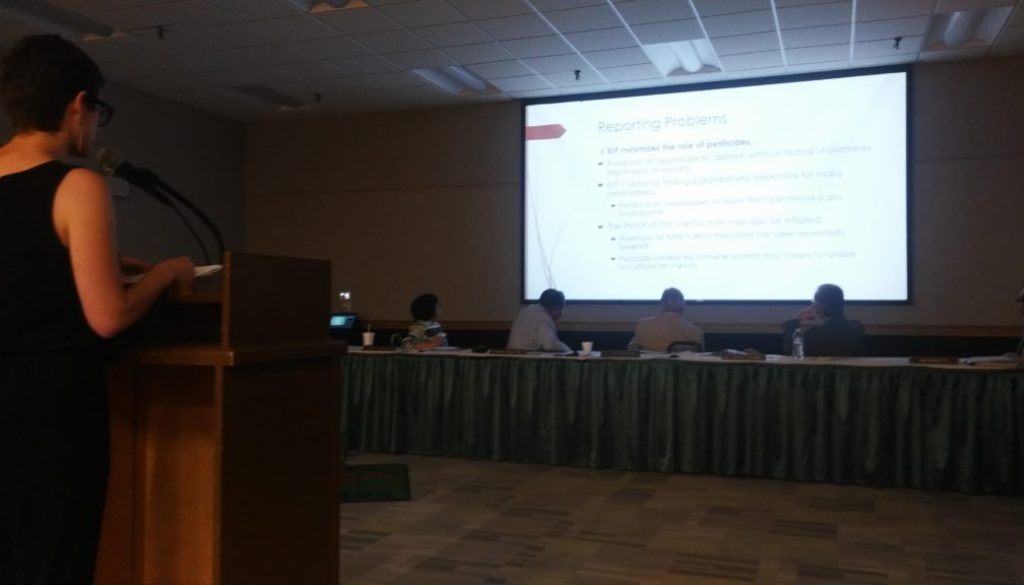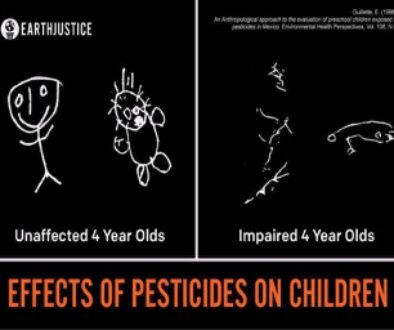NC Pesticide Board Meeting – July 12, 2016 – Neonic Task Force Created!
Board members present: Dr. Colleen Hudak-Wise, Dr. Ricky Langley (Chair), Dr. Thomas Scarborough (Vice-Chair), Shawn Harding, Don Rodgers, Dr. W. Benson Kirkman
The July 12, 2016 meeting of the North Carolina Pesticide Board began with a reading of the Mandatory Ethics Inquiry, which asks Board members to recuse themselves from actions in the event of a conflict of interest. None of the Board members recused themselves. Several presentations followed the reading of this inquiry, beginning with Brian Pointer of the Department of Environmental Quality’s Division of Water Resources, who spoke about the DWR’s Random Ambient Monitoring System, which monitors waterways for pesticides and other contaminants such as metals, coliform bacteria, cyanide, sulfides, and PCBs. In this presentation, Pointer provided an overview of the methods used in RAMS, as well as the limitations of this system. Of particular note is the fact that while RAMS does test for pesticides on a bi-monthly basis, it does not test for neonicotinoids. Pointer noted that the DWR does not have the funding capacity to conduct neonic testing of its samples.
Following Pointer’s presentation, Toxic Free NC intern Elisa Lazzarino presented on the methodological problems with both RAMS with respect to neonicotinoid contamination in aquatic invertebrate habitats – including those of endangered species – and the Bee-Informed Partnership Survey as a measure of pollinator decline and its causes. Ms. Lazzarino’s presentation also drew the Board’s attention to the widespread problem of consumer misuse of these highly toxic substances. Ms. Lazzarino remarked on the recently passed Maryland Pollinator Protection Act, which reclassified neonics as restricted use pesticides (RUPs) for professional use only, and pressed the Board to adopt a similar policy, through their authority under the NC Pesticide Law of 1971. After this presentation, Toxic Free NC Policy Advocate, Preston Peck, addressed the Board and noted their inaction after three previous presentations on these issues, and urged them to consider the growing body of evidence that strongly connects neonics to both pollinator decline and adverse health in aquatic invertebrates, particularly in view of the enormous economic value of North Carolina’s blue crab industry. Following these comments, the Board unanimously agreed to organize a task force of scientists to investigate the harms of neonics. The Board will accept nominations, and will then vote to approve these nominations.
Also presenting at the meeting were researchers from Preventing Agricultural Chemical Exposure (PACE) at Wake Forest University School of Medicine, who spoke about the neurological effects on farmworkers exposed to pesticides. Dr. Thomas Arcury spoke about the subclinical symptoms (i.e. not manifested physically) of pesticide exposure, and Dr. Sara Quandt spoke more directly to olfactory impairment in farmworkers exposed to pesticides as a likely marker of neurodegenerative diseases such as Parkinson’s. Dr. Paul Laurienti, also of Wake Forest University School of Medicine, spoke briefly about the strong correlation in pesticide-exposed farmworkers between exposure, balance, and brain anatomy. While Dr. Laurienti’s findings are not conclusive as a sign of ill-health in pesticide-exposed farmworkers, he stressed to the Board that the findings warrant further research.
Settlement Agreements for Violations of Pesticide Law
N.C. Department of Agriculture and Consumer Services, Structural Pest Control and Pesticide Division v.


